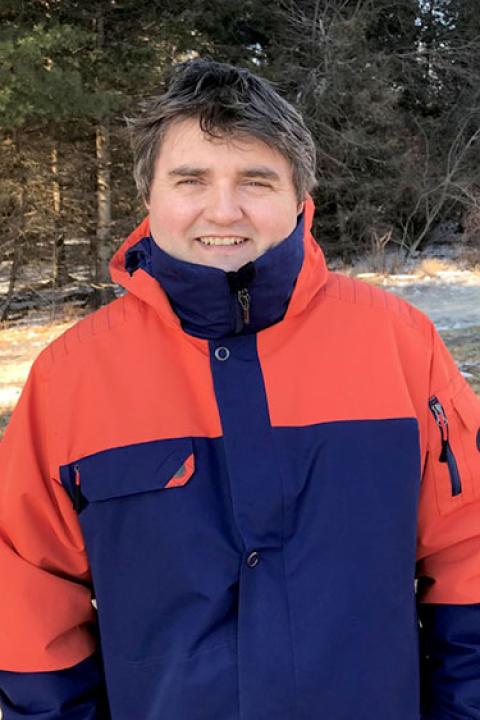
Kai Ziervogel
I am a microbial oceanographer studying the role of marine microbes (mainly bacteria) in the ocean’s carbon cycle. My lab is measuring rates and activities of microbes in the water column, sediments, and sinking particles known as marine snow, to address the role of heterotrophic bacterial in the biological carbon pump, and microbial responses to anthropogenic impacts on marine environments such as oil spills, plastic pollution, and increasing sea surface temperature.
Courses Taught
- ESCI 501: Introduction to Oceanography
- INCO 590: Student Research Experience
- INCO 790: Advanced Research Experience
Research Interests
- Biological Oceanography
- Geochemistry
Selected Publications
Dykens, K., Letscher, R., Matsuoka, A., & Ziervogel, K. (2025). New insights on the deep alkaline phosphatase paradox from a site in the Northeastern Pacific Ocean. Deep Sea Research Part I: Oceanographic Research Papers, 215, 104419. doi:10.1016/j.dsr.2024.104419
Ross, J., Kinner, N., Saupe, S., & Ziervogel, K. (2024). Sediment ballast accelerates sinking of Alaska North Slope crude oil measured ex situ with surface water from Cook Inlet. Environmental Research Communications, 6(7), 075032. doi:10.1088/2515-7620/ad6125
Ziervogel, K., Kehoe, S., De Jesus, A. Z., Saidi-Mehrabad, A., Robertson, M., Patterson, A., & Stubbins, A. (2024). Microbial interactions with microplastics: Insights into the plastic carbon cycle in the ocean. Marine Chemistry, 262, 104395. doi:10.1016/j.marchem.2024.104395
Caruso, G., & Ziervogel, K. (2022). Distribution and Metabolic Activities of Marine Microbes in Response to Natural and Anthropogenic Stressors. JOURNAL OF MARINE SCIENCE AND ENGINEERING, 10(8). doi:10.3390/jmse10081119
Ziervogel, K., Kamalanathan, M., & Quigg, A. (2022). Hydrolysis of Methylumbeliferyl Substrate Proxies for Esterase Activities as Indicator for Microbial Oil Degradation in the Ocean: Evidence from Observations in the Aftermath of the Deepwater Horizon Oil Spill (Gulf of Mexico). JOURNAL OF MARINE SCIENCE AND ENGINEERING, 10(5). doi:10.3390/jmse10050583
Kleindienst, S., Seidel, M., Ziervogel, K., Grim, S., Loftis, K., Harrison, S., . . . Joye, S. B. (2015). Chemical dispersants can suppress the activity of natural oil-degrading microorganisms. PROCEEDINGS OF THE NATIONAL ACADEMY OF SCIENCES OF THE UNITED STATES OF AMERICA, 112(48), 14900-14905. doi:10.1073/pnas.1507380112
Cardman, Z., Arnosti, C., Durbin, A., Ziervogel, K., Cox, C., Steen, A. D., & Teske, A. (2014). Verrucomicrobia Are Candidates for Polysaccharide-Degrading Bacterioplankton in an Arctic Fjord of Svalbard. APPLIED AND ENVIRONMENTAL MICROBIOLOGY, 80(12), 3749-3756. doi:10.1128/AEM.00899-14
Martinez-Garcia, M., Brazel, D. M., Swan, B. K., Arnosti, C., Chain, P. S. G., Reitenga, K. G., . . . Stepanauskas, R. (2012). Capturing Single Cell Genomes of Active Polysaccharide Degraders: An Unexpected Contribution of Verrucomicrobia. PLOS ONE, 7(4). doi:10.1371/journal.pone.0035314
Ziervogel, K., McKay, L., Rhodes, B., Osburn, C. L., Dickson-Brown, J., Arnosti, C., & Teske, A. (2012). Microbial Activities and Dissolved Organic Matter Dynamics in Oil-Contaminated Surface Seawater from the Deepwater Horizon Oil Spill Site. PLOS ONE, 7(4). doi:10.1371/journal.pone.0034816
Passow, U., Ziervogel, K., Asper, V., & Diercks, A. (2012). Marine snow formation in the aftermath of the Deepwater Horizon oil spill in the Gulf of Mexico. ENVIRONMENTAL RESEARCH LETTERS, 7(3). doi:10.1088/1748-9326/7/3/035301
